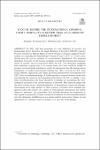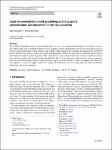Tìm kiếm
Tác giả
- Cooper, Davina (2)
- Eidenmüller, Horst (2)
- Emad, Gholam Reza (2)
- Fiorato, Sidia (2)
- Sau >
Chủ đề
- Vulnerability (3)
- CJEU (2)
- COVID-19 pandemic (2)
- Criminal Law (2)
- Sau >
Năm xuất bản
Toàn văn
Kết quả tìm kiếm
This article seeks to investigate the role that a symbol—connected to a legal event and a collective trauma—has in the construction of a past imaginary. It begins with a theoretical reflection on the role of the symbol as proposed by Juri Lotman and the function of repetition in the consolidation of collective memory. It subsequently focuses on the semiotic resonance of one specific object: the bulletproof cabin of the Nazi criminal Adolf Eichmann, used during his trial in Jerusalem, in 1961. I consider the ‘afterlives’ of this object, examining the different ‘remakes’ of Eichmann’s cabin in several mediatic and artistic contexts, focusing on the modalities that have anchored it to the post-1961 imaginary of the perpetrator and the legal consequences of his actions. |
This paper presents the cultural-historical activity theory (CHAT) or simply activity theory (AT) as a suitable framework to theorize seafarers’ learning in a technologically evolving shipboard environment. The recent increase in the digitalization and automation onboard ships is introduced with the aim of enhancing maritime safety and efficiency. However, maritime incidents and accidents continue to occur when seafarers overwhelmed by the complexity of novel technologies and automated tools, often fail to recognize and timely respond to developing hazards. The fundamental changes in the shipboard workplaces and the seafarers’ need for interaction with smart tools calls for a fresh look at cognitive and learning processes and situated action onboard ships. |
The EU social security Coordination Regulations envisage a special conflict rule that, under strict conditions, allows posted workers to maintain temporarily the social security insurance of the home Member State. The Portable Document A1 (PDA1), the proof of insurance, is a binding document for the institutions and courts of the host Member State that can only be invalidated or withdrawn by the institutions that issued it or by the corresponding national courts. The case-law of the European Court of Justice has clarified that under certain very specific circumstances a fraudulent foreign PDA1 can be disregarded by a Court, but never invalidated. Communication and collaboration between institutions of the issuing and receiving Member States and the judicial procedures for challengin... |
The use of maritime autonomous vessels for the inland waterway (IWW) transport can revolutionise the current logistics supply chain and enable the shifting of the cargo transportation from the less efficient road and rail transport modes. However, the lack of guidelines and requirements for the operation and testing of autonomous vessels must be addressed to enable autonomous operations. This study aims to identify the gaps of the prevailing regulatory, liability and insurance frameworks and propose viable recommendations for the operation and testing of the autonomous IWW vessels. The theoretical case study of a next-generation autonomous ship operating in European IWW along with the required key enabling technologies is considered. |
Common causes of wrongful conviction include eyewitness misidentification, improper forensics, or false confessions (Garrett in Convicting the innocent: where criminal prosecutions go wrong, Harvard University Press, Cambridge, 2011; Innocence Canada, https://www.innocencecanada.com/causes-of-wrongful-convictions/); whilst none of these factors are in question in this paper, the notion put forward is that a more implicit factor is also at play; that is, the newspaper coverage of a criminal case during the lead up to trial. According to Felton Rosulek (Text Talk 28:529–550, 2008), “[…] linguistic choices conspire together […] and create a specific interpretation of reality”. Thus, this paper explores how the accused and the (alleged) criminal events pertaining to a high-profile case ... |
Transnet National Ports Authority (TNPA) is the landlord and sole provider of marine services in South Africa’s eight commercial ports. Historically, TNPA set port prices for marine (nautical) services below full cost recovery. Price regulation has improved the situation, but substantial reforms are still required. This paper revisits marine services pricing in South Africa’s ports. The methodology employed content analysis to analyse 99 stakeholders’ submissions to the Ports Regulator of South Africa from financial years 2013/2014 to 2021/2022. The results are discussed under four categories of themes: concerns about the above-inflation price increase, suggestions on alternative marine services pricing models, concerns about marine services provision and productivity, and the dispu... |
Most legal evidence scholars agree that proof of guilt beyond a reasonable doubt requires the belief that the defendant probably committed the alleged acts. However, they also agree that this is not a sufficient condition, as this belief may be unreasonable. I focus on two popular proposals for additional conditions: (i) that the degree of belief should be robust and (ii) that it should be reasonable given the available evidence (should be an evidential probability). Both criteria face difficulties regarding their meaning and utility. I propose an interpretation which overcomes these difficulties and which combines the two conditions into a single criterion on which both conditions are about the possibility of overlooked, exculpatory information. Proof of guilt beyond a reasonable d... |
In 2021, with their proposals of a new definition of ‘ecocide’, the Independent Expert Panel for the Legal Definition of Ecocide (‘IEPLDE’) and the Promise Institute for Human Rights (‘UCLA’) Group of Experts reignited the discussion on expanding the International Criminal Court’s (‘ICC’ or ‘Court’) jurisdiction over the gravest instances of environmental degradation. The proposed definitions form part of the broader campaign towards the international criminalisation of ‘ecocide’ and its prosecution before the ICC. This discussion challenges such ambitions, arguing that, in its current form, the Court would be unable to produce environmentally-satisfactory results. It underscores that the human-centric fundaments of modern international criminal law (‘ICL’) prevent the ICC from fusi... |
This article draws on a recently completed study for the European Commission on trade secrets in the data economy. It distils the main findings of that Study and advances it by reflecting on and analyzing these findings in the context of existing legal, management and economics literature, as well as their implications for EU legal policymaking when it comes to trade secrets law. In order to facilitate data sharing, the article argues for a cautious approach, with very modest legislative reforms to the EU Trade Secrets Directive, instead preferring soft law and practical steps to be taken. There is, however, greater scope to reform legal regimes that are complementary to EU trade secrets law, such as the sui generis database right. |
The COVID-19 pandemic exposed sports administrators’ lack of crisis management preparedness and athletes, coaches, and support staff’s lack of mental preparedness for a pandemic. Sports administrators were in the unenviable position of having to protect the health of their athletes, staff, and the wider population by preventing the spread of the COVID-19 disease with restrictive policies, such as bio-bubbles and quarantines, while at the same time not restricting anyone’s liberty and unalienable rights to pursue happiness. This article informs sports administrators how to balance health instructions from regulatory bodies with measures protecting individual liberty. |










